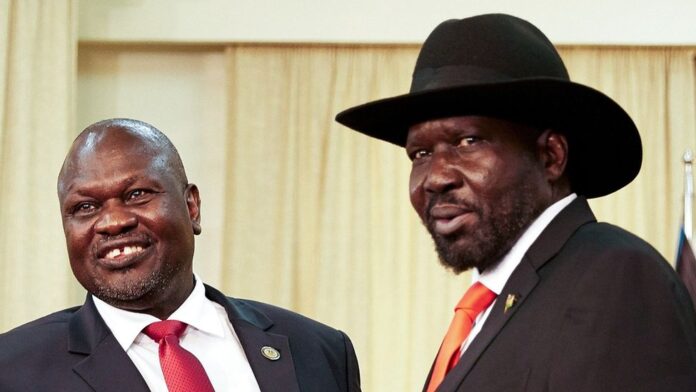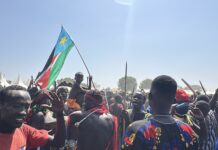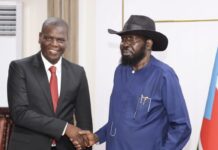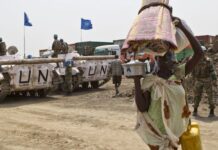Calls are intensifying for President Salva Kiir and First Vice President Dr. Riek Machar to take direct leadership in reviving inclusive peace talks, as deepening mistrust and legal tensions threaten to derail South Sudan’s fragile transition.
At the ongoing plenary meeting of the Reconstituted Joint Monitoring and Evaluation Commission (RJMEC) in Juba, Hon. Yolanda Awel Deng, a senior member of the SPLM-IO and former Minister of Health, called on the country’s top leaders to urgently convene and lead dialogue that includes all parties to the 2018 Revitalized Peace Agreement.
She also demanded the immediate release of SPLM-IO members currently in detention, describing their arrests as a “clear violation” of the peace accord.
The Other Political Parties (OPP) also raised alarm over what they described as a growing crisis of trust among peace partners. Speaking on behalf of the OPP, Hon. Wilson Sebit warned that communication breakdowns and failure to resolve issues early have led to escalating tensions.
“There is a complete lack of trust,” Sebit said. “This meeting is long overdue. RJMEC should act faster when problems arise — call the parties together before things fall apart.”
The OPP proposed regular bi-monthly meetings to prevent future escalations and ensure open channels for dialogue. Sebit also denounced the “unfair treatment” of smaller, unarmed political groups, arguing that decision-making is monopolized by armed actors.
“No one should have more power just because they carry weapons,” he asserted.
Beyond political grievances, the OPP highlighted widespread public suffering, including economic instability and flooding, noting that ordinary citizens are unable to access their own money from banks while hunger grows.
General Beale, representing the Former Detainees (FDs), criticized what he called unilateral decisions taken by parties to the peace agreement including abrupt leadership changes and cabinet reshuffles without consultation.
He warned that such actions breach the terms of the agreement. Beale also called for the revival of the Hybrid Court for South Sudan, a key accountability mechanism under the peace deal, and urged IGAD and the international community to step in to support its establishment.
Margaret Ajak, speaking for the South Sudan Opposition Alliance (SSOA), said the meeting was overdue but essential. She reminded leaders of President Kiir’s past commitment to never return South Sudan to war, urging them to uphold that pledge by “speaking the language of peace.”
Dr. Prosper Addo, representing the African Union, reiterated the importance of political dialogue and introduced the AU’s new Special Representative to South Sudan, Abdiweli Mohamed Ali Ghas. He called on all signatories to renew their commitment to the 2018 agreement.
“All eyes are on South Sudan,” said Dr. Addo. “We must choose peace, not war.”
From the government’s side, Dr. Joseph Geng Akec, of the Ministry of Justice, reported progress on establishing Chapter Five institutions, including commissions related to justice and reconciliation. He noted that commissioner appointments would happen soon.
However, Dr. Akec cautioned against discussing ongoing court cases during RJMEC meetings, warning that public commentary could undermine legal proceedings and due process.
The plenary concluded with a sobering warning from RJMEC itself: South Sudan stands at a critical crossroads, and the gains made since the 2018 peace agreement are at risk without urgent and coordinated action.
RJMEC urged all parties to recommit to inclusive dialogue, restore trust in institutions, and ensure no actor is left behind in decision-making.
As the country inches closer to its scheduled 2026 elections, today’s meeting made clear that only honest, inclusive, and sustained engagement among all stakeholders can keep South Sudan on the path to peace and democratic transition.





